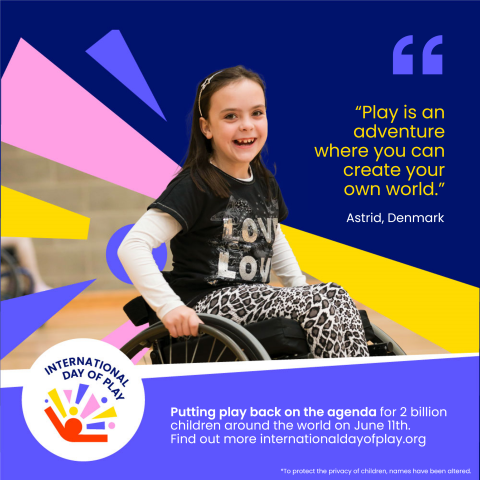
By Micah Peace Urquilla
The United Nations has declared June 11, 2024 the first annual International Day of Play in response to the advocacy of play researchers, community partners, and youth, and research that found that 1 in 3 children aren’t able to enjoy this right to its fullest. Many of these children are kids with IDD who face additional barriers including inaccessible play spaces, intensive therapy schedules in addition to school, and social exclusion.
Everyone loves to have fun, but we often underestimate the importance of play in our everyday lives, including the lives of kids with disabilities. Human beings are playful by nature, and for good reason: it helps children reach developmental goals, cultivate skills and relationships, and regulate attention and stress. As very small children, we begin to make sense of the world around us by playing – experimenting, exploring, and trying on different roles. Through play, children discover their strengths and interests and develop skills, whether it’s a jump shot or learning to take turns. Playing together provides countless opportunities for children to build friendships, navigate conflict, and express their creativity as they explore. Play supports mental health by releasing stress and encouraging the many aspects of PERMA, often all at once:
-
Positive Emotions – Having fun feels good and relieves stress.
-
Engagement – Play engages many different skills and capacities. Play lets kids experience flow, such as when a child might focus intently on lining up his toy cars, fingerpainting a masterpiece, or getting “in the zone” during a soccer game.
-
Relationships – When children play together, they practice social skills, problem-solve, build friendships, and learn to collaborate with others.
-
Meaning – Play lets children find new interests, exercise their imaginations, and gain a sense of important concepts like fairness, patience, and friendship. It is an avenue to be part of something bigger, and to have fun along the way.
-
Achievement – Play provides numerous chances for success. Some are concrete, like winning the big game, and others are more self-defined, like a child finally conquering the big slide they feared, but all help build kids’ confidence and self-esteem.
To ensure that all kids, including children with IDD, may enjoy these and the other benefits of play to their fullest, it’s up to the adults and decision-makers in kids’ lives to protect and invest in children’s right to play. We can do this in several ways:
-
Giving kids more time and opportunities to play. Parents may consider making room in a busy therapy schedule to attend an inclusive play group. Programs like Unified Sports create opportunities for youth with and without disabilities to play together on the same sports teams.
-
Respecting all kinds of play, and kids’ right to make decisions about how they play. For example, some Autistic children may prefer “parallel play” – playing alongside, rather than directly with other kids. There’s no right or wrong way to have fun.
-
Including play in universal design, ensuring that playgrounds, toys, and children’s spaces are accessible and fun for children of all abilities. Safety is important, but it must be balanced with the ability to take risks, make mistakes, and problem-solve.
-
Supporting children to develop social skills through play. Encourage child-directed play and provide support when needed, but don’t intervene the moment a challenge arises. If you need to intervene for support, offer ideas, choices, and assistance, but don’t rush to fix everything.
Protecting and promoting accessible, inclusive play for all children will promote better mental health, stronger relationships, and healthier communities for all of us. The fun begins June 11th – what will you do to support inclusion on the International Day of Play, and every day?
Sources:
-
Wang, S., & Aamodt, S. (2012). Play, stress, and the learning brain. Cerebrum: the Dana forum on brain science, 2012, 12.


